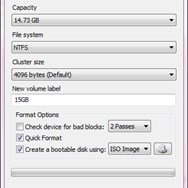Rufus vs YUMI
Compare features, pricing, and capabilities to find which solution is best for your needs.

Rufus
Rufus is a free, open-source utility designed to format and create bootable USB flash drives from various bootable ISOs including operating systems like Windows and Linux. It is known for its speed, ease of use, and comprehensive support for different bootable formats and partition schemes. by Akeo Consulting

YUMI
YUMI (Your Universal Multiboot Installer) is a powerful tool for creating bootable USB drives supporting multiple operating systems and utility tools. It allows users to consolidate various ISO images onto a single USB drive, enabling easy portability and installation of different distributions and software direct from a single USB. by Pendrivelinux.com
Comparison Summary
Rufus and YUMI are both powerful solutions in their space. Rufus offers rufus is a free, open-source utility designed to format and create bootable usb flash drives from various bootable isos including operating systems like windows and linux. it is known for its speed, ease of use, and comprehensive support for different bootable formats and partition schemes., while YUMI provides yumi (your universal multiboot installer) is a powerful tool for creating bootable usb drives supporting multiple operating systems and utility tools. it allows users to consolidate various iso images onto a single usb drive, enabling easy portability and installation of different distributions and software direct from a single usb.. Compare their features and pricing to find the best match for your needs.
Pros & Cons Comparison

Rufus
Analysis & Comparison
Advantages
Limitations

YUMI
Analysis & Comparison
Advantages
Limitations
Compare with Others
Explore more comparisons and alternatives














